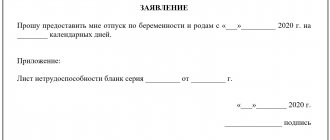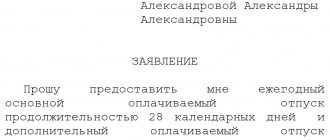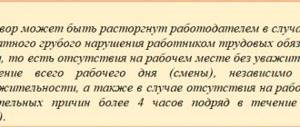An employee's prolonged absence from the workplace is a valid reason for terminating an employment contract with him. In addition, many entrepreneurs are interested in whether compensation is paid upon dismissal for absenteeism, because in this case the calculation procedure is not the same as for the standard departure of an employee at his own request.
The very concept of “truancy” includes the following:
- Absence from work for 4 hours or more, or during the entire working day/shift without good reason.
- Absenteeism from work if an open-ended employment contract was concluded.
- Unauthorized departure on vacation or time off.
- Skipping working days before the expiration of the contract, if it was issued for a specific period.
The definition of “workplace” is given in Art. 209 of the Labor Code of the Russian Federation: this is the place where the employee must be to perform his job duties or to which he must arrive to carry them out under the direct or indirect supervision of the employer.
Thus, having committed one of the above violations, an employee can not only receive a reprimand, but also “claim” dismissal under the article for absenteeism. Payments in this case will be calculated differently than in the case of termination of an employment contract through no fault of the employee.
In some cases, the offending employees manage to reach an agreement with their employers, and the days they miss are treated as leave without pay. Managers may not make concessions, insisting on dismissal, and the law will be on their side, because Absenteeism is considered a valid reason for terminating an employment contract at the initiative of the employer (clause a, clause 6, part 1, article 81 of the Labor Code of the Russian Federation). Employers themselves often offer employees who have committed such a gross violation to resign of their own free will, and if they do not agree with this, then in the work book, legally, as the reason for dismissal, there will be an entry “Dismissed due to absenteeism in accordance with paragraphs. and clause 6 of Art. 81 of the Labor Code of the Russian Federation,” which may interfere with further employment.
An important point is that the director cannot fire an offending subordinate if he is on vacation or sick leave, so he will have to wait for him to return to work. Also, the manager does not have the right to independently terminate the employment contract with a minor employee, because this requires the consent of the commission on minors’ affairs and the labor inspectorate (Article 269 of the Labor Code of the Russian Federation).
What other categories of citizens are subject to restrictions and cannot be fired:
- Pregnant women and people with children under 3 years of age, as well as parents raising children under 14 years of age alone.
- Single mothers or fathers raising a disabled child under 18 years of age.
Dismissal of an employee for absenteeism without good reason
Some categories of workers cannot be fired for absenteeism - these include employees under 18 years of age, pregnant women and single mothers forced to go on sick leave.
The Labor Code indicates that absenteeism cannot be considered a short-term absence of an employee from the workplace or being 10-15 minutes late. Absenteeism for which you can be fired is absence from work for 4 hours in a row, including a lunch break. Moreover, if within 2 days after absenteeism the employee was able to obtain and present to the manager documents indicating emergency incidents that forced him to come to work at the wrong time, absenteeism is not taken into account.
The same applies to some individual cases that can protect an employee from dismissal for absenteeism and from making an unpleasant entry in the work book:
- registration of sick leave within 2 days after absenteeism and taking sick leave;
- donating blood at a donor center and warning the employer about the need to be absent for the next 2 days.
In this case, the employer is obliged not only to draw up an absenteeism report, but also to comply with the procedure for dismissal for absenteeism, prescribed in the Labor Code of the Russian Federation, otherwise the employee can be reinstated in the workplace with payment of compensation for forced absenteeism through the fault of the employer in court.
If the absence lasted no more than 1 working day, the employee retains the right to receive compensation for unused vacation on the day of dismissal. But this rarely happens - if it is decided to part with a subordinate, the employer notifies him 3 days before dismissal.
If, due to absenteeism, the employee was not at work for a long time, it is necessary to assemble a disciplinary commission that will study the issue thoroughly and make a decision on dismissal. In this case, the employer will have to find the employee and inform him of the dismissal.
Dismissal for absence from work
Persons dismissed at the initiative of the employer for disciplinary action, in accordance with the provisions of clause 6, part 1, article 81 of the Labor Code of the Russian Federation, just like other resigning employees, have the right to receive severance pay accrued at the place of performance of functional duties until the moment of dismissal. However, there are a number of nuances visible here.
Absenteeism is considered to be the absence of a person from the workplace (Article 209 of the Labor Code of the Russian Federation) for 4 hours , provided that he did not provide appropriate explanations for his absence within two working days. In this case, absence from the workplace must be documented in an appropriate document.
If the reason for dismissal is a single working day, this circumstance may not affect vacation compensation upon dismissal for absenteeism.
However, in practice, such cases do not occur, since when dismissing for absenteeism, the employer is obliged to notify the violator of the dismissal in an official form, against signature - no later than 3 days before the intended dismissal. Taking these factors into account, dismissal may be delayed.
If absenteeism results in prolonged absence from work, it will be necessary to organize a disciplinary commission, which will issue its verdict on the need for dismissal . And an individual entrepreneur will have to look for the absentee in order to notify him officially.
There is clearly a legal requirement to include in the severance pay compensation for days of vacation not taken, but the number of such days is quite difficult to reliably determine if absence from work lasts more than two weeks.
More detailed information about dismissal for absence from work is given in the following video:
Is vacation compensation paid upon dismissal for absenteeism?
If an employee went on vacation, from which he did not return due to his own fault, which led to dismissal, it is assumed that he is not entitled to compensation for vacation upon dismissal for absenteeism.
But if the employer was in good faith mistaken that absence from work was dictated by valid reasons, which were subsequently not confirmed by documents, then the elapsed time can be counted towards compensation for unused vacation upon dismissal for absenteeism.
For example, on the first day after the end of vacation, a citizen calls the director or manager and reports an imaginary illness.
Waiting for sick leave to be submitted may take more than 16 days, which is equivalent to one month of work in cases where compensation for vacation is calculated.
According to the regulations of the Labor Code, there is no provision for canceling the accrual of vacation pay for days not paid for one reason or another.
For example, leave without pay is not taken into account as grounds for not granting leave.
The same algorithm applies to other cases when the employee did not receive wages, but was on the payroll.
When dismissing for disciplinary action, it is necessary to take into account the statute of limitations, which is one month from the date of the violation (Article 193 of the Labor Code of the Russian Federation).
Therefore, compensation for vacation days is calculated for the period from the first working day, after being hired or returning from another vacation, to the last working day.
In addition, the truant will need personal confirmation of the offense committed, in the form of an explanatory note. If they have not provided an explanatory note, an act of refusal to provide it must be drawn up .
In each specific case, it is necessary to proceed from the accompanying circumstances:
Is compensation paid for vacation upon dismissal for absenteeism?
If an employee was on vacation and did not return to work due to his own fault, which is why he was fired, compensation for unused vacation will not be paid upon dismissal.
If the employer was mistaken in good faith that the employee had good reasons for missing work, and in the future it turned out that there were no good reasons for missing work, all days elapsed while waiting for supporting documents should be taken into account when calculating compensation for rest upon dismissal. reason for absenteeism.
That is, let’s say an employee’s vacation has ended, but he does not go to work, calls his manager and says that he is seriously ill. The employer waits 3 weeks to be provided with sick leave, but the employee does not bring it. These 21 days are rounded up to a full month and are equal to working days in the case of calculating the amount of compensation for vacation.
Compensation payment for unused vacation is calculated for the period from the 1st working day after signing the employment contract until the last day of work.
Labor legislation does not cancel the payment of vacation compensation for days that were not paid to the employee. For example, leave at one’s own expense is not paid by the employer, and yet its duration is taken into account when paying compensation.
Days of absenteeism should not be taken into account on vacation, but only if they are registered as absenteeism, and if there is an act of absenteeism. The employee must draw up an explanatory note himself and admit in writing that he is absent from the workplace during working hours. If he refuses to write such a document, it is necessary to draw up an act of his refusal. In general, the following rules apply:
- if the report of absenteeism is not completed in accordance with all the rules, the days of absenteeism must be taken into account when paying compensation for unused vacation;
- if the truancy report is drawn up as it should, the days of truancy can be deducted.
What can an employee who is fired for absenteeism claim?
Current labor legislation provides for a number of “final” payments in different situations. In particular: salary, compensation for vacation that was not used, severance pay. Is this all right for a truant?
Also, read our material about how to fire a negligent employee for absenteeism.
Articles on the topic (click to view)
- What to do and where to go if you are not paid upon dismissal
- What to do if you are laid off at work
- What to do if the employer does not want to fire at his own request
- What to do if the date of the dismissal order is later than the date of dismissal
- What to do if the employer does not give the work book after dismissal
- What to do if you didn’t work officially, you were fired, you didn’t get paid
- What is the employer obliged to give the employee on the day of dismissal?
Wage
If you are fired for absenteeism, will you be paid? All work must be paid
. If an employee worked a certain number of days and then stopped going to work, then he needs to be given money for the period actually worked. Naturally, nothing will be compensated for days of absenteeism. This is quite fair. Where and what can be cut:
- bonuses;
- other financial incentives paid for fulfilling the plan, conscientious work, and so on.
This is also quite fair. In simple terms: it is quite possible for a absentee to be paid a bare salary - the amount that is the main one in the employment contract.
You cannot refuse to transfer:
- compensation for fuels and lubricants;
- reimbursements for the use of mobile communications;
- business trips.
These payments do not constitute any kind of incentive. Generally speaking, they are of a compensatory nature. For example, if a food delivery courier purchased gasoline at his own expense under the conditions that the employer, at the end of the month, compensates for these funds. This is what should be done. Not otherwise.
How to calculate lost wages for an unworked period?
It could be simpler:
- subtract the amount already received from your monthly income;
- pay the balance.
But the point is that you shouldn’t forget to “throw away” the days you missed.
Payment for unused vacation
Another payment that must be transferred to the employee, despite the fact that he is a violator of labor discipline. Every employee has the right to leave
Expert opinion
Novikov Oleg Tarasovich
Legal consultant with 7 years of experience. Specializes in criminal law. Member of the Bar Association.
Even if we consider the issue from an everyday point of view, it turns out that a person has been earning vacation for a long time, and these paid “days of freedom” cannot be burned out even because of such a serious violation of discipline.
Theoretically, a truant worker can receive some kind of dismissal benefit, if this is provided for by local regulations . In practice, this cannot be realistic. I would like to look at an organization whose collective agreement, say, states that someone fired for absenteeism has the right to additional payments.
Compensation for leave upon dismissal for absenteeism: step-by-step calculation algorithm
If an employee is fired for absenteeism, the employer has the right to calculate payments without taking into account bonuses and other monetary incentives.
First of all, you need to calculate the number of days that should be included when calculating compensation:
- Let's look at how many days were designated as absenteeism in the truancy report.
- The days from the date of dismissal are calculated downwards, changing the period that must be compensated (skip the point if the absenteeism report is not properly completed).
- From the identified date, you need to calculate the number of full months that have passed since the start date of work after annual leave or from the date of admission to the staff (skip the point if the truancy report is not drawn up according to the rules).
- If an employee worked less than half a month, the month is discarded. If more than half, it is counted as full.
- Find the number of days counted for each full month.
- The result must be multiplied by the number of months that were worked.
To calculate the number of days for all months, you can use the following formula:
WHAT = BEFORE/12 months.,
where CHTDO is the number of working days taken into account when assigning leave;
TO – duration of vacation.
The amount of compensation payment for vacations not taken is calculated using the formula:
KNO = SDZ * CHTDO,
where KNO is compensation for unused vacation;
SDZ – average daily earnings.
In addition to compensation, wages must be paid for time worked. If an employee is fired for absenteeism, the following algorithm must be taken into account:
- calculate the number of shifts worked that were not previously paid;
- remove days of absenteeism;
- all other days should be paid in the amount of average daily earnings.
Average daily earnings can be determined using the following formula:
SDZ = ORZ/KKDOP,
where ORZ is the total salary (excluding insurance payments);
KKDOP - the number of calendar days for the period worked (if there is an absenteeism report, days of absenteeism are also taken into account).
Calculation of compensation amount
In practice, some accountants find it difficult to calculate the amount of compensation. Actually, it's not that difficult to do. Calculations are carried out according to the following algorithm:
- First, you need to determine how many vacation days the dismissed employee has. We do the following:
- We set the duration of annual leave, which cannot be less than 28 days.
- Divide it by 12 (the number of months in a year).
- Multiply by the number of months worked.
- Subtract the number of days used.
If an employee worked 15 (14 for February) days in a month, then he is counted as a full-time employee.
- Next, you need to understand what the person’s daily earnings were:
- We establish how much money was paid during the year.
- We divide by 12 months if the person has worked for a year or more.
- We divide the resulting amount by 29.3. The latter is the average number of days in a month, which is used in labor legislation for calculations.
- All that remains is to multiply the number of days of unused vacation by daily earnings.
For clarity, let's give an example:
It turns out that you need to take exactly 12 months of work into account. Petrov was entitled to a standard vacation of 28 days. We calculate the number of unused days: 28:12*12=28 days Petrov has in stock.
Common mistakes
Error: The employer does not take into account days of absenteeism when calculating compensation for unused vacation for a dismissed employee, without properly filing an absenteeism report.
Comment: If the procedure for dismissal due to absenteeism is not followed, the employer is obliged to take into account the days of absenteeism when calculating compensation for unused vacation.
Error: The employee was an hour late for work, was fired for absenteeism and was deprived of compensation for unused vacation.
Comment: Being 1 hour late is not considered absenteeism - only failure to show up for work for 4 hours in a row without supporting documents indicating the presence of a valid reason for absenteeism. An employee cannot be deprived of compensation for vacation, no matter what the reason for dismissal, unless the employee committed absenteeism immediately after his annual leave.
Deductions from these cash payments
Regardless of the reason for dismissal, taxes on income are withheld according to the sources of legislation:
Funds accrued towards severance pay for:
- days due for vacation;
- days worked.
The tax withholding amount is 13% of the accrued amount . In addition, if the accrued amount exceeds the average daily earnings, mandatory deductions are provided:
- to the Social Insurance Fund of the Russian Federation;
- to the Pension Fund of the Russian Federation.
Answers to common questions about what compensation for leave upon dismissal for absenteeism
Question No. 1: Is it possible to pay an employee later than the day of dismissal if the employment relationship was terminated due to absenteeism?
Answer: No, despite the fact that the employee himself is to blame for the dismissal, the employer must comply with legal regulations and make final payments on the day of dismissal.
Question No. 2: An employee who was fired for absenteeism did not show up for work to collect the money and work book due to him, what should the employer do?
Answer: If an employee does not show up for work within 3 days, the employer is obliged to send him a notice of the need to come for money and a work book.
The letter must be registered with return receipt requested. Rate the quality of the article. Your opinion is important to us:
Deadlines for final settlement with the dismissed person
According to the provisions of the Labor Code of the Russian Federation, all “final” payments are made on the last working day . If a person does not go to work, then all the money should be credited to him and, if possible, transferred on the day the order is signed (read about how to document the procedure for dismissal for absenteeism here, and from this article you will learn how number and within what time frame the offender must be fired).
How is forced absenteeism compensated for illegal dismissal?
The employer is obliged to pay for absenteeism , even if the employee at this time:
- got a new job and has no plans to return to the previous one;
- received unemployment benefits;
- managed to retire;
- filed for disability and received disability benefits in all other cases.
The amount of payment is determined as the average earnings for the last 12 months at this place of work. If an employee has worked for less than a year, then either a monthly or daily calculation is applied. In any case, the amount of payments should not be less than the minimum wage established by law. The calculation takes into account not only the salary, but also:
- bonuses;
- allowances;
- odds, etc.
However, social or compensation payments (material assistance, payment for travel to the place of work, etc.) are not taken into account.
If during absenteeism at the enterprise the salary increased or its minimum was increased by law, then this should also be reflected in the payments in the direction of their increase.
If, along with the dismissal, the employee was transferred a benefit, then the amount
compensation payments are reduced by the amount already paid. Payment for illegal absenteeism is subject to personal income tax at the rate of 13%. They are retained and transferred to the tax service by the organization’s accounting department. However, compensation for moral damage is not subject to any encumbrances and is paid in full.
The organization has the right to demand compensation from the person who committed unlawful dismissal. If, for example, a director illegally fired an employee, then the trade union may bring a claim against him.
How to use and achieve compensation for employees during the liquidation of an organization is described in detail in our article. What are incentive payments and who is entitled to them? Read more about this in our article.
Are you preparing for retirement? Then this material will be useful to you.
Get compensation and benefits
- An act must be drawn up stating that the employee is not at work at the appointed time. It is signed by two or more witnesses who will be ready to confirm in court that the employee was not present.
- Absenteeism is indicated on the working time sheet.
- An employee who missed work draws up an explanatory note. If he does not agree to write the paper within 2 days, an act is drawn up indicating his refusal. The act is given to the employee for signature. If he refuses to sign, a third act is drawn up with 2 witnesses - about refusal to provide explanations.
- An Order of Dismissal is drawn up and given to the truant for signature. If you refuse to sign, a corresponding note is placed in the order.
- An entry is made in the work book, after which the document is given to the dismissed person on the day of leaving work.
- Together with the work book, all the money due is given: the last month’s salary, along with the required additional payments, allowances and bonuses, as well as compensation for vacation to which the employee had the right, but which was not used.
We recommend reading: Renting apartments in Moscow on cyan
Some questions and answers
Question 1. An employee whose contract was terminated for absenteeism applied for paid leave before dismissal. How can an employer do the right thing{q}
Answer. An employee does not have the right to take vacation time before dismissal. The employment agreement with him has already been terminated due to guilty actions (Article 127 of the Labor Code). For previously unused vacation, he will receive legal payments, but nothing more.
Question 2. An employee who was fired for absenteeism worked at the company for 8 days. Should he be paid compensation for vacation days{q}
Answer. When an employee has been in a position in an organization for less than half a month, no vacation compensation is paid.
The types of liability to which an employer can be held are as follows:
- material;
- administrative;
- criminal
If the employer has not paid all the funds due on time, then he can be charged 1/150 of the refinancing rate of the Central Bank of the Russian Federation for the period of delay in payment of wages (about what to do if you were fired for absenteeism, as well as how to save your career and reputation, can be found here).
Administrative responsibility is established by Art. 5.27 Code of Administrative Offences. The organization can be fined up to 50 thousand rubles.
Important! Criminal liability is provided
Art. 145.1 of the Criminal Code of the Russian Federation
. The maximum penalty is up to 5 years in prison.
Thus, a person fired for absenteeism is entitled to a number of payments that are due to persons dismissed for other reasons. Payment must be made in full upon dismissal. If this does not happen, the employer can be held liable.
If you find an error, please highlight a piece of text and press Ctrl Enter.
Conditions for dismissal during absenteeism
Legislative acts formulate some conditions that will serve as serious grounds for absenteeism and dismissal of an employee:
- without warning, leaving the workplace without permission, without notification of the duration of absence and reasons;
departure on annual leave without notice, independently, as well as unauthorized use of time off by an employee (see → “How to get annual basic paid leave?”).
A gross violation, followed by dismissal, is recognized not only as absenteeism, but also:
- for being under the influence (alcohol, drugs);
- failure to maintain official secrets that are known to the staff in connection with the performance of their duties under the employment contract;
- petty/large theft of company property, personal belongings of co-workers;
- intentional damage or breakage of work equipment;
- committing actions that resulted in a fire, accident, or accident at the workplace knowingly (if the employee was familiarized with safety precautions and did not comply with the requirements).
A detailed list of gross violations of discipline provides grounds for termination of employment relations on the basis of clause 6, part 1, art. 81 Labor Code of the Russian Federation.
Payment amount calculation
The calculation of the amount due for forced absence from work is based on data on the average earnings of a specific employee, which is calculated in accordance with Art. 139 Labor Code of the Russian Federation.
For a correct calculation, it is necessary to take into account all payments that management makes to its employees and which relate to the remuneration system. This:
- bonus payments;
- various allowances;
- insurance compensation;
- regional coefficients.
Cannot be taken into account:
- financial assistance from management or trade union;
- compensation payments for food, mobile communications, travel, fuel, etc.;
- funds that are a refund for studies and advanced training courses.
Also, for the calculation, you need to take into account the actual time worked by these workers. The following periods cannot be taken into account:
- the average salary was retained for this employee;
- being on sick leave;
- the worker was in downtime, which was due to the fault of management or for reasons that were in no way dependent on the parties;
- other periods listed in paragraph 5 of Resolution No. 922.
In Art. 139 of the Labor Code of the Russian Federation provides a unified algorithm for calculating average earnings. The formula is as follows:
Wed. charge = actual wages for the last year / number of days actually worked in this period
The amount of compensation for days of forced absence is calculated using the following formula:
Amount Comp. = average earnings of a specific employee * number of days of forced absence
Important
You need to take into account exactly those days that were working days for a particular employee. That is, it is not calendar days that need to be taken into account, but working days, according to the timesheet.
Employer's liability for violations
The types of liability to which an employer can be held are as follows:
- material;
- administrative;
- criminal
If the employer has not paid all the funds due on time, then he can be charged 1/150 of the refinancing rate of the Central Bank of the Russian Federation for the period of delay in payment of wages (about what to do if you were fired for absenteeism, as well as how to save your career and reputation, can be found here).
Administrative responsibility is established by Art. 5.27 Code of Administrative Offences . The organization can be fined up to 50 thousand rubles.
Thus, a person fired for absenteeism is entitled to a number of payments that are due to persons dismissed for other reasons. Payment must be made in full upon dismissal. If this does not happen, the employer can be held liable.
Source: urexpert.online
Question: An employee has been absent from work for three months. Then he was given one day of leave at his own expense, which is the day of termination of the employment contract. Are days off during absenteeism included in the employee’s vacation period when calculating compensation for unused vacation?
On this issue, we adhere to the following position: Weekends falling during a period of long absence should not be included in the length of service of the employee giving the right to vacation.
Justification for the position: As follows from part two of Art. 22 and parts of the first article. 56 of the Labor Code of the Russian Federation, the employer is obliged to provide the employee with work stipulated by the employment contract, and the employee has the right to this (part one of Article 21 of the Labor Code of the Russian Federation). As follows from Art. 76 of the Labor Code of the Russian Federation, the legislation does not provide for the possibility of removing from work an employee who has been absent for a long time until the reasons for his absence are clarified. Consequently, the employer is obliged to allow an employee to work who has returned to work after a long absence. If the employee’s absence from the workplace was caused by unexcusable reasons, then the employer has the right to dismiss the employee for absenteeism (clause “a”, paragraph 6 of part one of Article 81 of the Labor Code of the Russian Federation). Subparagraph “a” of paragraph 6 applies both in cases where the employee, after absenteeism, began work, and in the event of actual abandonment of work without the intention of continuing it; in both the first and second cases, the date of dismissal is considered to be the last day of work (section “Termination of an employment contract at the initiative of the employer (Article 81 of the Labor Code of the Russian Federation)” from the Generalization of the practice of considering cases of termination of an employment contract in the 1st half of 2008 by the courts of the Saratov region at the initiative of the employer and on other grounds not related to the will of the employee), except for cases where the employee did not actually work, but in accordance with the Labor Code of the Russian Federation or other federal law, his place of work (position) was retained (part three of Article 84.1 Labor Code of the Russian Federation). If, after absenteeism, the employee returned to work and performed his job duties, then this very day will be the day of termination of the employment contract. The time worked by the employee on the day of termination of the employment contract must be taken into account by the employer (part four of Article 91 of the Labor Code of the Russian Federation) and paid. Please note that the dismissal of an employee at the initiative of the employer while on vacation, including without pay, in accordance with part six of Art. 81 of the Labor Code of the Russian Federation is not allowed. Therefore, the day of termination of the employment contract in the case under consideration will be the employee’s last day of work, following the end of the vacation at his own expense. If an employee at the time of dismissal did not use paid leave for the current working year or for several years, then according to Art. 127 of the Labor Code of the Russian Federation, upon dismissal, he is paid monetary compensation for all days of unused vacation. To determine the amount of monetary compensation, it is necessary to calculate the length of the employee’s vacation period and the corresponding number of vacation days. Part one of Art. 121 of the Labor Code of the Russian Federation establishes that the length of service that gives the right to annual basic paid leave includes the time when the employee did not actually work, but after him in accordance with labor legislation and other regulatory legal acts containing labor law norms, a collective agreement, agreements , local regulations, and an employment contract preserved the place of work (position), including the time of annual paid leave, non-working holidays, weekends and other rest days provided to the employee. In accordance with part two of Art. 121 of the Labor Code of the Russian Federation, the length of service that gives the right to annual basic paid leave does not include the time the employee is absent from work without good reason. Obviously, absenteeism by an employee is possible only during working hours. At the same time, until dismissal, the absent employee retains his place of work, respectively, this employee’s days off for the purposes of applying part one of Art. 121 of the Labor Code of the Russian Federation are the time when the employee retains his place of work (position). In this regard, with a formal approach, we can conclude that from the employee’s vacation experience it is necessary to exclude only the days marked in the working time sheet as days of absenteeism (AD).*(1) That is, working days according to the employee’s schedule will be excluded when he is without was not present at the workplace for valid reasons. And the employee’s days off, which fell during the period of his long absence, by virtue of part one of Art. 121 of the Labor Code of the Russian Federation must be included in his vacation experience to calculate compensation for unused vacation. Meanwhile, in our opinion, the formal approach violates one of the basic principles of legal regulation of labor relations, namely equality of rights and opportunities for workers (Article 2 of the Labor Code of the Russian Federation). Part two of Art. 3 of the Labor Code of the Russian Federation establishes that no one can receive any benefits regardless of gender, race, skin color, nationality, language, origin, property, family, social and official status, age, place of residence, attitude to religion, political beliefs, membership or non-belonging to public associations, as well as other circumstances not related to the employee’s business qualities. In our opinion, the inclusion of days off that fall during a period of long-term absenteeism of an employee in the length of service giving the right to annual paid leave puts workers in an unequal position when exercising their right to leave. Moreover, in part two of Art. 121 of the Labor Code of the Russian Federation, we are not talking about days of absenteeism, but about the time of absence. The wording “time the employee is absent from work without good reason” allows us to interpret the time of absence as a certain period, which includes all days falling during this time, including weekends. Therefore, we believe that weekends falling during a period of long absence should not be included in the employee’s length of service, which gives the right to vacation. From the cassation ruling of the Investigative Committee for civil cases of the Magadan Regional Court dated March 22, 2011 in case No. 2-3335/10, it follows that the Judicial Collegium for Civil Cases of the Magadan Regional Court holds a similar opinion. We have not found any judicial practice that would suggest a different legal position on this issue. However, we draw your attention to the fact that this position is only our expert opinion. Unfortunately, we have not found any official clarification on this issue, so we recommend that you submit a request to the Federal Service for Labor and Employment (Rostrud) by mail (109012, Moscow, Birzhevaya Square, Building 1) or by filling out a special application form on the official website department (https://www.rostrud.ru/reception/55.shtml) in accordance with Art. 356 of the Labor Code of the Russian Federation, the Regulations on the Federal Service for Labor and Employment, approved by Decree of the Government of the Russian Federation of June 30, 2004 N 324, as well as the Administrative Regulations for the provision by the Federal Service for Labor and Employment of public services for informing and consulting employers and employees on compliance with labor legislation and other regulatory legal acts containing labor law norms, approved by order of the Ministry of Health and Social Development of the Russian Federation dated May 18, 2012 N 581n.
Answer prepared by: Expert of the Legal Consulting Service GARANT Natalya Panova
Response quality control: Reviewer of the Legal Consulting Service GARANT Voronova Elena
April 19, 2013
The material was prepared on the basis of individual written consultation provided as part of the Legal Consulting service. For detailed information about the service, contact your service manager.
───────────────────────────────────────── ───────── ─────────────────────── *(1) Work time sheet forms (N T-12 and N T-13) were approved by the Decree of the State Statistics Committee of Russia dated 05.01. 2004 N 1. The same document approved the Instructions for the use and completion of forms of primary accounting documentation for recording working hours and settlements with personnel for wages (hereinafter referred to as the Instructions). According to the Instructions, notes in the Report Card on the reasons for absence from work and others are made on the basis of documents drawn up properly. Accordingly, until the reasons for the employee’s absence are clarified, all days of absence in the time sheet, including weekends, are marked with the letter code NN or digital code 30, after establishing the fact of absenteeism - PR or 24, while only working days are marked with the letter code PR, and weekends - B or 26. In other words, on weekends according to the schedule, absenteeism is not indicated.
Source: hr-portal.ru
What is illegal truancy?
The concept of “illegal absenteeism” is not contained in the legislation, however, Article 234 of the Labor Code states that the employer is obliged to compensate the employee for the damage caused to the latter due to deprivation of his right to work. In other words, if an employee was unable to start work due to the fault of his superiors, then he must still receive the average salary for this period, even if there was absenteeism.
As a rule, this situation arises in the event of illegal dismissal.
When such a situation arises, workers often turn to a labor dispute commission or trade union to restore their rights. However, in accordance with Article 391 of the Labor Code, only the court has the right to recover wages for illegal absenteeism.
Of course, a commission or trade union can provide a former employee with advisory assistance, but within 10 days they must explain to the applicant the procedure for collecting what is due in court.
The statute of limitations for cases of wrongful dismissal is only a month, so you need to hurry.
In this case, the report begins from the day when the employee was given a copy of the dismissal order or a work book with the corresponding entry.
If such documents are not issued, but there is some kind of “oral order”, then the employee has the right to continue to go to work, perform his duties and receive his salary in full.
What kind of absenteeism is considered forced?
There is no definition of “forced absenteeism” in the Labor Code. It is believed that any absence of an employee for more than four hours is a violation of labor regulations, for which the violator may be dismissed or severe disciplinary measures taken. Nevertheless, we are all living people and life circumstances are different, because of which you can get into an unpleasant situation at work.
According to the law, there are no mitigating factors for absenteeism, but it is customary to distinguish between valid and disrespectful reasons. The first category includes the following situations:
- a traffic accident on the way to work;
- sudden hospitalization or death of a close relative;
- collapse of public transport or on roads;
- home emergencies, such as a broken water pipe;
- long waits for a local doctor for yourself or a child, etc.
It is important to understand that valid reasons for absenteeism, even for a few hours, must be supported by something (for example, a sick leave certificate, a certificate, even a receipt for calling a repairman in the event of an accident in the house). Unexcused reasons are not of significant significance and are usually of a personal nature (for example, an unauthorized decision not to go to work).
Deciding whether the reason for absence from work was objective and important depends on the opinion of the manager. Sometimes the same event can be interpreted differently depending on the circumstances, frequency of repetition and personal attitude.
A special variant of forced absenteeism is considered to be illegal actions of a boss towards an employee. This is usually connected when a manager wants to fire an employee, demote him or, conversely, comes up with ways to keep him at work. The most common actions are listed below:
- Removal from office without significant cause.
- Incorrect dismissal procedure, including unilateral dismissal.
- Transfer to another position without the written consent of the employee.
- Delay in issuing a work book upon dismissal, etc.
Calculation example
In order to correctly calculate average earnings on your own, you need to have a clear example.
Example
Employee G. worked at the company from the beginning of 2014 and was fired on 10/31/2021. He decided it was illegal and filed a lawsuit. The court ruled in favor of the plaintiff (employee G.) and decided to reinstate him to his job from 02/01/2021. The period from 01.11.2021 to 31.01.2021, according to the court decision, is considered forced absence of working days. This period is subject to payment.
To calculate, you need to know the following data:
- the salary of employee G. has not changed over the last calendar year and is 42,600 rubles;
- employee G. went on vacation from 06/01/2021 to 06/03/2017. Vacation pay for this period – 43,100 rubles;
- was on sick leave from 09/01/2021 to 09/09/2017. During this period he received 15,680 rubles;
- Based on the results of work for the first half of 2021, he received a bonus in the amount of 27,800 rubles.
Calculation:
- total earnings for the last year (42,600 * 10) + (42,600 – 15,680) + 27,800 = 480,720 rubles;
- total number of days actually worked: 23+ 23 + 22 + 15 + 18 + 23 + 22 + 20 + 22 + 23 + 16 + 23 = 250 days
- the period of forced absence accounted for 22 + 21 + 15 = 58 days
- the average earnings of a G. worker for the last year are 480,720 / 250 = 1,922.88 rubles
- for days of forced absence, the employer must pay him 1,922.88 * 58 = 111,527.04 rubles.
Important
If the employee was paid severance pay upon dismissal, the court may decide to offset this amount against the payment of compensation.







